|
Seven-day Trekking
on the
Great Wall

|
PRICE TABLE
(Per Person)
|
# of Head |
USD |
|
1 |
3129 |
|
2 |
1629 |
| 3 |
1599 |
|
4-5 |
1429 |
|
6-9 |
1289 |
INCLUDED
IN THE PRICES
* Personal transfers
from and to hotel
* Entry fees to the Great Wall
* One-night camping on the Great Wall
* Accommodation of 3 other nights in local hostels or farmer's
courtyards
* 5 lunches, 4dinners and 4 breakfasts
* Quality vehicle, professional driver and English-speaking tour
guide
* Free airport or train station drop-off
* Free membership card
* A credit of RMB200 when you reserve the next tour with us
Guaranteed no detours to shops,
markets, factories, etc.
Climbing Pole Rental:
$6/each/day;
$10/pair/day.
|
|
 Complimentary
1-day Beijing Group Tour Complimentary
1-day Beijing Group Tour
Forbidden City, Temple of Heaven and
Summer Palace!

FREE AIRPORT PICKUP!
|
TRAVEL INSURANCE
If you currently don’t have travel insurance then
you will be required to purchase our PICC (People's Insurance
Company of China) travel and accidental insurance.
The fee will be $7.99 per person, and will cover the duration of
your hiking/camping/trekking in order to ensure that you are
comprehensively protected if injured.
For more information about our travel insurance policy please
see our insurance page.
|


convenient and comfortable
shuttle vehicles
|
|
Seven-day Epic "Wild Wall" Odyssey
TOUR 7B:
Shixiaguan-Huanghuacheng-Xishuiyu-Jiankou-Mutianyu-Gubeikou-Jinshanling-Huangyaguan-Baiyangyu
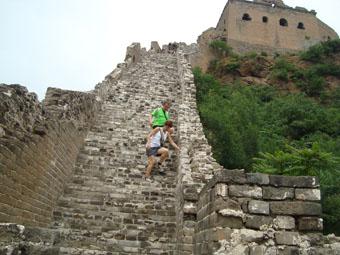
If you're looking for a rough and tumble hiking
experience than this is the tour for you. You'll get
to explore the best of the unrestored "Wild Wall"
sections. Please keep in mind that this is a
physically and mentally challenging program, so
please make sure that you are in the right physical
and mental condition, as each day averages at least
five hours of hiking.
While hiking the fan-favorite
paths of Jiankou-Mutianyu and
Jinshanling-Simatai,
you'll also get to experience some of the more
overlooked trails, like the unrestored Badaling to
Shixiaguan and
Huanghuacheng-Xishuiyu. For those
looking for that extra special memory-you'll be able
to camp overnight in one of the Great Wall
watchtowers, allowing you to view both the sunset
and sunrise over the Great Wall. To top it all off,
we end your adventure with a visit to Baiyangyu,
which features an especially rare trait-a 1.5km
piece of the wall that is pure marble. As always,
this tour comes with your own English-speaking guide
and driver.
Highlights:
- Explore the best
of the Great Wall's dramatic ruins while pushing
yourself to the limit both mentally and
physically
- Trek the two most
popular Great Wall hikes, while also
experiencing some of the more underrated gems
- Camp overnight in
one of the Great Wall watchtowers!
- Witness elusive
such sites as the Great Wall underwater and the
marble Great Wall
- Free airport
pickup!
Departure:
Our Great Wall hiking is a
private service. What this means is that you can hike on the Great
Wall at any time at your convenience. If you
would much rather be part of a group for
the experience for economic and social reasons,
we'll check to see if there are more signups for the same date as
your own. We'll keep you updated whenever there are more. If you
would like to keep your tour a private one, please let us know and
we'll assign you a guide and driver.
Day-by-day
Trekking Itinerary
|
Day 1:
Beijing-Shixiaguan-Badaling
(L+D,
5 hours)
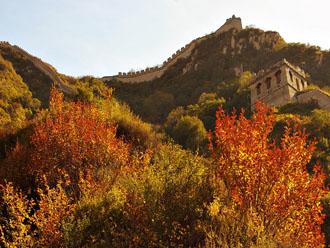 You will be picked up at your hotel (or
a nearby area) from 10:00 am by your English-speaking guide
and driver, and from there we will drive to the Shixiaguan Pass Great Wall.
It is about 70km away, and will take us approx. 1.5 hours of
driving. After we arrive in the Great Wall area, we'll
have some lunch at a local restaurant. Following lunch we’ll
start our hike. You will be picked up at your hotel (or
a nearby area) from 10:00 am by your English-speaking guide
and driver, and from there we will drive to the Shixiaguan Pass Great Wall.
It is about 70km away, and will take us approx. 1.5 hours of
driving. After we arrive in the Great Wall area, we'll
have some lunch at a local restaurant. Following lunch we’ll
start our hike.
We;ll
start with the Badaling section of the Great Wall. The
ruined Badaling Great Wall (now officially named “Ancient
Badaling Great Wall”) is 10km southwest of the restored
Badaling Great Wall. So, as its name hints, this section of
the Great Wall is partially restored and more adventurous,
while not being easy to climb. It is the least touristy
section of the Great Wall around Beijing, which is
officially opened to the public (you are not advised to hike
the wild section of the Wall in Beijing). Its hikers are
mainly foreign travelers instead of domestic travelers, who
prefer hiking at the restored Badaling Great Wall.
After about 2-3 hours of hiking, we’ll cross over into Shixiaguan
(Stone Gorge) Pass, 5km southwest of the Badaling section of
the Great Wall. It is one of the most intact parts of the whole
Great Wall. In spite of serious damage, the winding wall set
in the lofty mountains reveals its grandeur. However, a
castle in Shixiaguan was pulled down during the Great Leap
Forward. Nevertheless, the wall remains relatively intact
because of its strategic location. Shixiaguan Pass was
originally built in the reign of Ming Emperor Wanli (about
1600 AD), which was then a key pass guarded by a large
number of soldiers. There are sites such as official
residences, the ancient castle, clay walls and brick walls
in the village. Most of the villagers know stories about the
site as well as the Great Wall. One of the tales is about
the peasant's uprising during the Ming Dynasty. After the
founding of Dashun
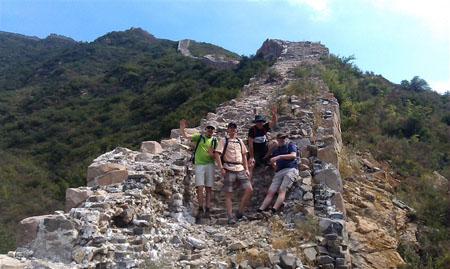 State in Xi'an in 1644 during the reign
of Ming Emperor Chongzhen, Li Zicheng was the leader of the
peasants from northern Shaanxi Province, who wanted to
overthrow the emperors and the Ming Dynasty. Li led his army
east to Badaling Pass. While the rebels were trying to think
of a way to occupy Badaling Pass, an old man advised them to
pretend to lead the army to Shixiaguan Pass. The general of
the official army in Badaling was cheated into going to
Shixiaguan Pass, which gave Li the opportunity to enter
Beijing through Badaling successfully. Emperor Chongzhen
committed suicide, ending the Ming Dynasty. Li proclaimed
himself Emperor of the Shun Dynasty which was short-lived,
as about a month later, his army was defeated by the Manchus,
who established the Qing Dynasty. State in Xi'an in 1644 during the reign
of Ming Emperor Chongzhen, Li Zicheng was the leader of the
peasants from northern Shaanxi Province, who wanted to
overthrow the emperors and the Ming Dynasty. Li led his army
east to Badaling Pass. While the rebels were trying to think
of a way to occupy Badaling Pass, an old man advised them to
pretend to lead the army to Shixiaguan Pass. The general of
the official army in Badaling was cheated into going to
Shixiaguan Pass, which gave Li the opportunity to enter
Beijing through Badaling successfully. Emperor Chongzhen
committed suicide, ending the Ming Dynasty. Li proclaimed
himself Emperor of the Shun Dynasty which was short-lived,
as about a month later, his army was defeated by the Manchus,
who established the Qing Dynasty.
We'll drive to Huanghuacheng after the hike to have a
delicious dinner and overnight in a local hostel.
|
Day
2: Huanghuacheng-Xishuiyu
(B+L+ D, 4.5 hours)
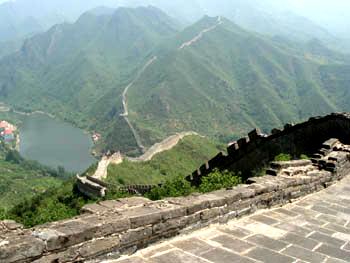 After
a short walk around the dam on the Huanghuacheng Reservoir, we will
start our hike westward to Xishuiyu. Going to Huanghuacheng Great
Wall, you have four things to do at least. First, you should take
photos. Since the lake breaks this section of the Great Wall into
three segments naturally, its uniqueness might surprise you. And the
Huanghuacheng Reservoir lies here, shaped like a curved moon.
Second, go to visit the chestnut garden under the Great Wall, dating
back to the Ming Dynasty. The ancient chestnut trees still grow very
well. Third, climb up the steepest section of the Huanghuacheng
Great Wall, Shibadeng. It is like a dragon, ready to fly into the
blue sky. Fourth, look at Yaoziyu Castle. It was built in the Ming
Dynasty, still well preserved. In the castle, there is an ancient
Chinese scholar tree. It is said that touching it could bring you a
blessing. After
a short walk around the dam on the Huanghuacheng Reservoir, we will
start our hike westward to Xishuiyu. Going to Huanghuacheng Great
Wall, you have four things to do at least. First, you should take
photos. Since the lake breaks this section of the Great Wall into
three segments naturally, its uniqueness might surprise you. And the
Huanghuacheng Reservoir lies here, shaped like a curved moon.
Second, go to visit the chestnut garden under the Great Wall, dating
back to the Ming Dynasty. The ancient chestnut trees still grow very
well. Third, climb up the steepest section of the Huanghuacheng
Great Wall, Shibadeng. It is like a dragon, ready to fly into the
blue sky. Fourth, look at Yaoziyu Castle. It was built in the Ming
Dynasty, still well preserved. In the castle, there is an ancient
Chinese scholar tree. It is said that touching it could bring you a
blessing.
The highest point of the wall is a broken watchtower, and from there
you will have a wide panoramic view of the whole valley. From this
summit the Wall dives steeply downwards into the valley. The Gate is
located at the bottom, an opening in the wall, which connects the Zhuangdaokou village on the inside, with the still-well-preserved
Yaoziyu Castle, built in the Ming Dynasty, on the outside. Over the
top of the passageway is another watchtower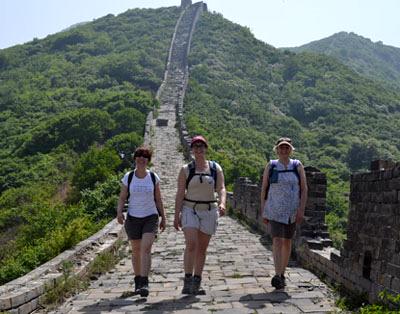 where we will rest a
short while before continuing on. On the inside of the gate you will
notice three large characters carved in the stone, indicating the
name of the village – ZhuangDaoKou. On the outside is written the
name of the passageway - “ZhenNu Pass” - meaning “Defeat to
Invaders”, a warning to potential attackers in ancient times. where we will rest a
short while before continuing on. On the inside of the gate you will
notice three large characters carved in the stone, indicating the
name of the village – ZhuangDaoKou. On the outside is written the
name of the passageway - “ZhenNu Pass” - meaning “Defeat to
Invaders”, a warning to potential attackers in ancient times.
From here we will continue to trek westward, climbing towards the
broken wall to our destination, a peak overlooking Xishuiyu
Lake. From our vantage point, we will see a real treat, the
broken wall running underwater!
Tonight, we'll sleep in an inn called "Deep Missing," a
certified hostel by Great Wall Adventure Club. You'll enjoy
the typical Chinese country-style dinner and breakfast. One
of the favorite food they serve is the Green Onion Wheat Pie
made by the chief chef, who is also the boss fo this inn.
So, try it!
 Optional Camping on the Great Wall Tonight Optional Camping on the Great Wall Tonight
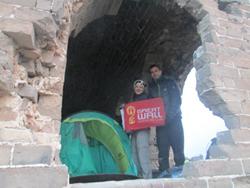 Spend
the night under the stars on the Great Wall for an Optional Camping
on the Great Wall
additional fee of 540 RMB/person (USD $89/person) Spend
the night under the stars on the Great Wall for an Optional Camping
on the Great Wall
additional fee of 540 RMB/person (USD $89/person)
You have the unique opportunity to camp in a watchtower at
Jiankou tonight! You'll be able to spend the night on the Great Wall under
the glow of the stars. Our local supplier, who owns a local
restaurant and inn, will carry the tent and sleeping pads for you
and place them in the watchtower. This will takes about 40 minutes,
as he has to reach the Great Wall by climbing a mountain path from
his restaurant at the foot of the mountain. He will also cook for
you a BBQ dinner, which will include Chinese wheat buns or pancakes,
kebabs (beef, pork or chicken), vegetables, photo chips, and fruits,
along with two bottles of local beers, spirits and other colas.
While he is setting up your camping equipment and making your meals,
please make sure to let him know your gratitude for all of his hard
and dedicated work!
|
Day 3: Jiankou-Mutianyu (B+L+D, 3 hours)
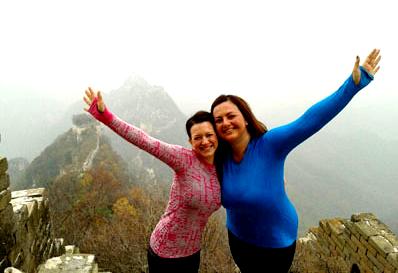 The day starts at 7:30 AM for
breakfast in the hotel, and then we will head over to the Jiankou
section and continue to hike its striking and rugged terrain. Along
the way we will encounter some watchtowers that have fallen into a
state of disrepair. It is an interesting contrast compared with the
restored section you will see later at Mutainyu. The day starts at 7:30 AM for
breakfast in the hotel, and then we will head over to the Jiankou
section and continue to hike its striking and rugged terrain. Along
the way we will encounter some watchtowers that have fallen into a
state of disrepair. It is an interesting contrast compared with the
restored section you will see later at Mutainyu.
From Jiankou you will cross over onto Mutianyu, a section of the
wall that has been mostly restored. Although it has gotten a
face-lift, it avoids the army of tourists that plague Badaling.
Mutianyu offers some breathtaking views of the valley and wall
below, and if you look to your right you’ll see a large sign
engraved in the side of the mountain encouraging you to “Cherish
Chairman Mao”.
You can hike down to the parking lot, take the cable car, or slide
down on the toboggan* (Lots of fun and highly recommended!). Our
driver will be waiting to take you to lunch at a local farmer’s
restaurant! After lunch we will drive back to your hotel. At the
hotel you will have a chance to refresh yourself and have dinner.
You will probably sleep like a rock after today’s hike!
*Mutianyu cable car or toboggan is extra.
Not included in the package price.
|
Day 4: Gubeikou-Jinshanling (B+L+D, 10 kms,
4 hours)
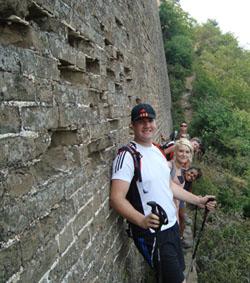 After
breakfast, we will head to the Great Wall at Gubeikou to
start our hike. Gubeikou Great Wall occupies a strategically
important location, which is difficult to access. Situated between Shanhaiguan Pass and Juyongguan Pass, and about 62 miles to Beijing,
it is the bastion protecting the northern gateway to the capital.
There are 14 beacon towers, 143 watchtowers, 16 strategic pass,
three citadels and many other military constructions. Many of them
are famous cultural relics, such as the Big Flower Beacon Tower of
the Northern Qi Dynasty, Fairy Tower, General Tower, and the
dominant Wangjing Tower. After
breakfast, we will head to the Great Wall at Gubeikou to
start our hike. Gubeikou Great Wall occupies a strategically
important location, which is difficult to access. Situated between Shanhaiguan Pass and Juyongguan Pass, and about 62 miles to Beijing,
it is the bastion protecting the northern gateway to the capital.
There are 14 beacon towers, 143 watchtowers, 16 strategic pass,
three citadels and many other military constructions. Many of them
are famous cultural relics, such as the Big Flower Beacon Tower of
the Northern Qi Dynasty, Fairy Tower, General Tower, and the
dominant Wangjing Tower.
In 1933, when Japanese forces invaded China, the Chinese
army at Gubeikou fought hard to resist the enemy. it marked the
beginning of China's eight-year-long war to fight against Japanese
invasion in the World World II.
After walking on Gubeikou we will cross over to Jinshanling. Much of
the hiking that we will do on Jinshanling today is relatively easy,
as much of the wall here is restored and the surface smooth.
Jinshanling has five main passes and 67 watchtowers. Every 100
meters (328 feet), there is an enemy tower each of which is about
ten meters (33 feet) high. Featuring various structures and having
various functions, those watchtowers are either one tiered or
two-tiered. Among them, the most celebrated are the Big and Small Jinshan Watchtowers. The Wangjinglou Tower, the General Tower, the
Black Tower and the Taochun Tower are also must-sees on the
Jinshanling Great Wall. Each tower has its legend. Legend has it
that the stone bars used to build the Wangjinglou Tower were carried
to the mountaintop by Er Lang Shen, the nephew of the Jade Emperor.
The general tower was named to commemorate Wu Guihua, a heroine who
sacrificed herself to resist northern invader's invasion in the Ming
Dynasty. The Black Tower and the Taochun Tower were christened to
commemorate two girls, Heigu and Taochun, who made great
contributions to the construction of the Great Wall.
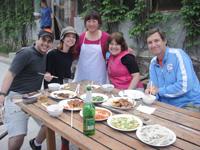 This
afternoon, you'll watch the sunset while walking along the Wall.
Then we'll take you to have a gorgeous Chinese countryside style
dinner served by a local guesthouse owner and also the master chef.
The chef used to work in large company's canteen for 28 years! He is
going to
serve you Kong Pao Chicken, Stewed beef and potato, Green Pepper and
Pork, Fried Tofu in Spicy Sauce, Fried Egg Tomato, Sweet and Sour
Chicken, and vegetables (great for vegetarians), and soup.
What's more important is that all the
vegetables he uses are planted in his own yard, so it is organic and
fresh! This
afternoon, you'll watch the sunset while walking along the Wall.
Then we'll take you to have a gorgeous Chinese countryside style
dinner served by a local guesthouse owner and also the master chef.
The chef used to work in large company's canteen for 28 years! He is
going to
serve you Kong Pao Chicken, Stewed beef and potato, Green Pepper and
Pork, Fried Tofu in Spicy Sauce, Fried Egg Tomato, Sweet and Sour
Chicken, and vegetables (great for vegetarians), and soup.
What's more important is that all the
vegetables he uses are planted in his own yard, so it is organic and
fresh!
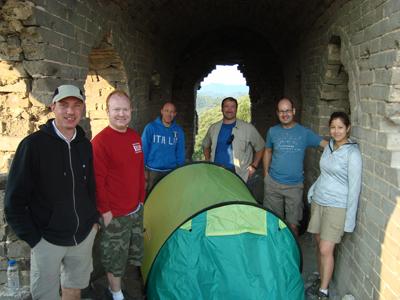
Then, before it gets dark, we'll go up to the mountain and sleep overnight in a
watch tower. We'll prepare the necessary camping
facilities such as sleeping bags so you don't have to bring
anything but yourself. Here it is the sound sleeper's paradise -
let the mountain valley and the Great Wall echo your snoring sound! We'll prepare the necessary camping
facilities such as sleeping bags so you don't have to bring
anything but yourself. If you prefer sleeping in a local hostel or a
farmer's house, you certainly can without extra charge.
However, in cold winter, we'll only overnight in a local hotel for safe.
Temperature on the Great Wall is usually 10 degree Celsius lower
than it is on the ground.
|
Day 5: Jianshanling-West Simatai
(B+L+D, 3 hours)
The first thing we'll do today is to watch the magnificent
sunrise early in the morning. After a hearty breakfast (You can have
your breakfast delivered to the watchtower and enjoy your Great Wall
breakfast for just RMB 100/person.) with eggs, bread, milk
etc., we will resume our hike on Jinshanling's right wing, where we
will hike until we reach Simatai West
called Second Valley. As we head west the wall
will start to gradually deteriorate, making the hike progressively
more challenging, but also interesting to observe and compare.
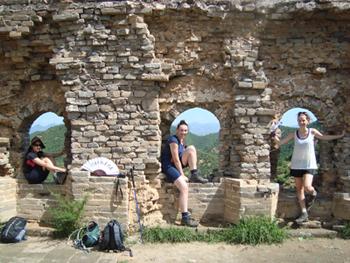 The
Jinshanling Great Wall has not been repaired since 1570. It is a
remote and relatively isolated section of the Great Wall. As there
are relatively even fewer tourists at Second Valley part of
Jinshanling Great Wall, it is a good place to explore on foot. If
you are looking for breathtaking views with a relatively peaceful
walk, then the Second Valley of Jinshanling can't be better, so we
hope that you remembered to bring your camera! The Second Valley
features a complicated and well preserved fortification system at
Jinshanling. The Second Valley Great Wall meanders through fantastic
natural scenery and connects to the Gubeikou Great Wall to the west. The
Jinshanling Great Wall has not been repaired since 1570. It is a
remote and relatively isolated section of the Great Wall. As there
are relatively even fewer tourists at Second Valley part of
Jinshanling Great Wall, it is a good place to explore on foot. If
you are looking for breathtaking views with a relatively peaceful
walk, then the Second Valley of Jinshanling can't be better, so we
hope that you remembered to bring your camera! The Second Valley
features a complicated and well preserved fortification system at
Jinshanling. The Second Valley Great Wall meanders through fantastic
natural scenery and connects to the Gubeikou Great Wall to the west.
Simatai West, called the Second Valley, is the left wing of
Simatai. It is also in a serious state of ruins and
is thereby a perfect example of the true Great Wall, while also
being extremely beautiful and rustic. The wall is 7.8 m high and 5 -
6 m thick at the bottom. On the top, the wall is about 4 meters wide
with 2 meters high parapets on each side. On the side facing the
enemy were 2 m high crenels called Duokou. On the upper part of the
Duokou were large openings used to watch and shoot at attackers. On
the lower part were small openings ('loopholes') through which
defenders could also shoot while in greater safety from incoming fire.
In addition to the gorgeous scenery on your hike, you'll also get to
see how the wall was designed for practical purposes, that being the
defense against outer enemies and how the Great Wall was supposed to
keep them out. There are 'obstacle-walls' built perpendicular to the
parapets - a feature quite unique to the Second Valley part of
Jinshanling Great Wall. These 'walls-within-walls' were used for
defense against enemies who might have succeeded in scaling the
outer wall. The steps of the Great Wall at Second Valley are rather
steep and rocky with loose stones at times. It is important to
choose comfortable footwear with a good grip and support for the
feet.
After about 2-3 hours of hiking on Second Valley, we’ll again meet
up with our van and you’ll be taken back to Beijing, where you will
be dropped off at your hotel to have a rest.
At 6 pm, we'll pick you up from your hotel to watch the famous
Chinese acrobatic show at Chaoyang Theater to relax and have a
wonderful visual treatment. We'll send you back to your hotel after
the show. It officially ends the 5-day Great Wall adventure!
|
Day 6:
Huangyaguan
Section (B+L+D, 3
hours)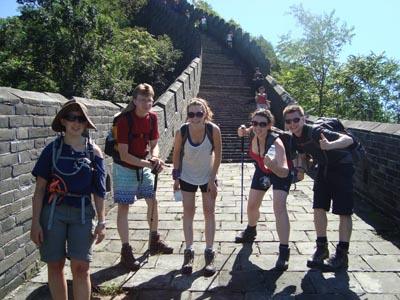
Huangyaguan is situated in a beautiful valley in the heart of the
Yanshan Mountains. We start our walk heading up the steep renovated
steps towards what appears to be a sheer cliff face. This is where
we encounter "Heavens Ladder", a steep climb of over 200 steps
leading us up to the cliff face.
Once we have caught our breaths,
the path continues gradually up to the top of the ridge and once
again the old Wall, which follows the contours of the mountain. We
drop down into the nearby valley and clamber along the Wall as it
gradually descends to the valley below.
We'll sleep in a local hotel or a farmer's hostel whichever is
available during the time.
|
Day 7: Baiyangyu Marble Wall (B+L, 3 hours)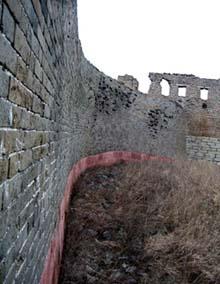
After breakfast, we will make our way west along the wall into
Baiyangyu. Baiyangyu enjoys the unique reputation of marble
Great Wall. “Baiyangyu” literally means “White Sheep
Valley”. A river called Baiyang River passes the valley from
north to south. There used to be a grand water pass of the Great
Wall bridging the valley which now still divides the Baiyangyu
Great Wall into two sections – East and West.
Baiyangyu Great Wall has some unique features different from
other sections of the Wall. Firstly, its water pass town had a
double water wall – upper part and lower part, constituting a
solid water town which was easy for self-defense and attacking
invaders as well, part of the military defense system in
Baiyangyu Great wall. Second, the east section of the Wall has a
1.5km unique marble wall,
10km high and 5m wide, rarely seen among other sections of the
wall. Third, among other towers, Shenwei Tower
(Powerful Tower) on the west section of Baiyangyu Great Wall is
the most remarkable. Unlike other watch-towers sitting on the
wall, it was constructed to the outer side of the wall. If you
walk eastward from Baiyangyu Great Wall, you will reach Xuliukou
Great Wall and on to Shanhaiguan Pass meeting the ocean; walking
westward, you get to Badaling Great Wall around Beijing.
We'll drive back to Beijing after the hike
and at about 4 p.m., you'll be in the city again.
|
|







 You will be picked up at your hotel (or
a nearby area) from 10:00 am by your English-speaking guide
and driver, and from there we will drive to the Shixiaguan Pass Great Wall.
It is about 70km away, and will take us approx. 1.5 hours of
driving. After we arrive in the Great Wall area, we'll
have some lunch at a local restaurant. Following lunch we’ll
start our hike.
You will be picked up at your hotel (or
a nearby area) from 10:00 am by your English-speaking guide
and driver, and from there we will drive to the Shixiaguan Pass Great Wall.
It is about 70km away, and will take us approx. 1.5 hours of
driving. After we arrive in the Great Wall area, we'll
have some lunch at a local restaurant. Following lunch we’ll
start our hike.  Spend
the night under the stars on the Great Wall for an Optional Camping
on the Great Wall
additional fee of 540 RMB/person (USD $89/person)
Spend
the night under the stars on the Great Wall for an Optional Camping
on the Great Wall
additional fee of 540 RMB/person (USD $89/person) The day starts at 7:30 AM for
breakfast in the hotel, and then we will head over to the Jiankou
section and continue to hike its striking and rugged terrain. Along
the way we will encounter some watchtowers that have fallen into a
state of disrepair. It is an interesting contrast compared with the
restored section you will see later at
The day starts at 7:30 AM for
breakfast in the hotel, and then we will head over to the Jiankou
section and continue to hike its striking and rugged terrain. Along
the way we will encounter some watchtowers that have fallen into a
state of disrepair. It is an interesting contrast compared with the
restored section you will see later at  After
breakfast, we will head to the Great Wall at
After
breakfast, we will head to the Great Wall at  This
afternoon, you'll watch the sunset while walking along the Wall.
Then we'll take you to have a gorgeous Chinese countryside style
dinner served by a local guesthouse owner and also the master chef.
The chef used to work in large company's canteen for 28 years! He is
going to
serve you Kong Pao Chicken, Stewed beef and potato, Green Pepper and
Pork, Fried Tofu in Spicy Sauce, Fried Egg Tomato, Sweet and Sour
Chicken, and vegetables (great for vegetarians), and soup.
What's more important is that all the
vegetables he uses are planted in his own yard, so it is organic and
fresh!
This
afternoon, you'll watch the sunset while walking along the Wall.
Then we'll take you to have a gorgeous Chinese countryside style
dinner served by a local guesthouse owner and also the master chef.
The chef used to work in large company's canteen for 28 years! He is
going to
serve you Kong Pao Chicken, Stewed beef and potato, Green Pepper and
Pork, Fried Tofu in Spicy Sauce, Fried Egg Tomato, Sweet and Sour
Chicken, and vegetables (great for vegetarians), and soup.
What's more important is that all the
vegetables he uses are planted in his own yard, so it is organic and
fresh!


